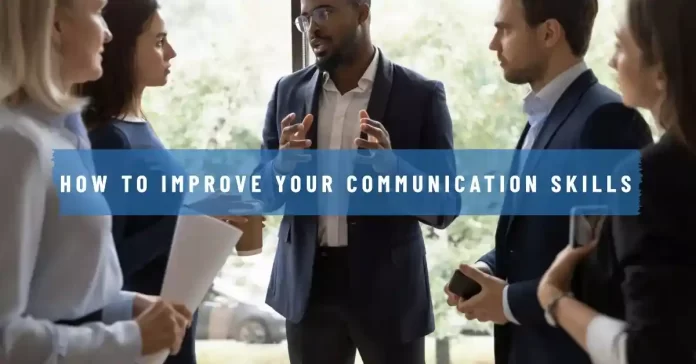Effective communication is a fundamental skill that plays a role in building relationships and achieving success in various aspects of life. You can foster improved understanding, collaboration, and connection with others, both in personal and professional interactions, by enhancing your communication skills. We will explore practical techniques and strategies to increase your communication skills and foster stronger relationships.
Practical Techniques for Better Connections
Active Listening
To communicate effectively, actively listen by giving your full attention, maintaining eye contact, and refraining from interruptions. Active listening is an essential element of effective communication. Engage with the speaker by nodding, using verbal cues, and summarizing their points. Active listening demonstrates respect and empathy and deepens understanding.
Active listening is an essential element of effective communication. Practice these techniques to become a better listener:
• Stay fully attentive to the speaker.
• Maintain eye contact and use body language to show interest.
• Refrain from interrupting and let the speaker conclude before responding.
• Ask clarifying questions to ensure understanding.
• Reflect on what you’ve heard to confirm your understanding.Clear and Concise Expression
Non-verbal communication speaks volumes. Pay attention to your body language, facial expressions, and gestures when communicating with someone. Maintain an open posture, make appropriate eye contact, and use hand movements to emphasize your points. Be aware of the tone of your voice, as it can convey different emotions and attitudes. Aligning your non-verbal cues with your spoken words can enhance the clarity and impact of your message.
Improving your communication skills also involves expressing yourself clearly and concisely. Consider the following tips:
• Organize your thoughts before speaking.
• Use straightforward language.
• Mind your tone and body language.
• Focus on the main points and avoid rambling or unnecessary details.
• Check for understanding by asking if your message was clear.Empathy and Understanding
To avoid misunderstandings and misinterpretations, practice clarifying and confirming information. When receiving instructions or feedback, ask questions to ensure a clear understanding. When providing information, actively encourage the listener to ask questions for clarification. Repeat or paraphrase crucial points to ensure and give them a chance to correct any misunderstandings. You can enhance accuracy and avoid unnecessary confusion by clarifying and confirming.
Developing empathy and understanding is crucial for effective communication. Try these techniques:
• Empathize with the other person and strive to understand their perspective.
• Show empathy by acknowledging and validating their feelings and experiences.
• Practice patience and avoid jumping to conclusions or making assumptions.
• Encourage the person to share their thoughts and feelings by asking open-ended questions.
• Practice active empathy by actively engaging in conversations and showing genuine interest.Nonverbal Communication
Developing empathy and understanding is crucial for effective communication. Put yourself in the other person’s shoes and strive to comprehend their perspective. Show genuine interest and concern by acknowledging their feelings and validating their experiences. Practice empathy through active listening, verbal expressions of chemistry, and offering support when necessary. Building a foundation of understanding creates a safe and open space for meaningful conversations.
Nonverbal cues play a significant role in communication. Pay attention to the following aspects:
• Show attentiveness and interest by maintaining good eye contact.
• Convey emotions effectively by using appropriate facial expressions.
• Be aware of your body language and posture, which can influence how your message is received.
• Use gestures and hand movements to enhance your message but avoid distracting activity.
• Attention to the other person’s nonverbal cues to better understand their feelings and reactions.Feedback and Conflict Resolution
Active listening, maintaining eye contact, and using open body language are crucial for effective communication. When giving feedback, focus on specific behaviors or actions, and provide constructive suggestions for improvement. Use “I” statements to express your observations and feelings, avoiding blame or judgment. When receiving feedback, be open to listening without becoming defensive. Reflect on the feedback and consider how you can make positive changes. Constructive feedback promotes growth and development in both personal and professional relationships.
Ineffective communication, providing constructive feedback, and resolving conflicts are essential components. Consider these techniques:
• Offer feedback constructively and respectfully to promote effective communication.
• Focus on specific behaviors or situations rather than attacking the individual when providing feedback, fostering more effective communication.
• Use “I” statements to express your thoughts and feelings without placing blame or making accusations, promoting a more constructive and empathetic form of communication.
• Practice active listening during conflicts to understand the other person’s perspective.
• Look for common ground and seek win-win solutions when resolving conflict.
Final Words
Improving your communication skills is a lifelong journey that requires practice and mindfulness. You can strengthen your connections with others and enhance the quality of your interactions by implementing these practical techniques, such as active listening, non-verbal communication, clarifying and confirming empathy and understanding, and constructive feedback. Remember, effective communication is a powerful tool that can positively impact all areas of your life.
Frequently Asked Questions (FAQs)
How can I become a better communicator?
Improving your communication skills involves active listening, clear expression, and understanding non-verbal cues. Practice these skills, seek feedback, and learn from effective communicators.
What can I do to communicate more effectively in professional settings?
In professional settings, focus on being clear, concise, and confident in your communication. Tailor your message to the audience, maintain professionalism, and use appropriate body language.
How can I handle misunderstandings or conflicts during communication?
Address misunderstandings by actively seeking clarification, expressing yourself calmly, and practicing empathy. When conflicts arise, actively listen, search for common ground, and strive for resolution through open dialogue.
Are there any techniques to improve my active listening skills?
To improve active listening, give your full attention, maintain eye contact, and avoid distractions. Show understanding through nodding, paraphrasing, and asking relevant questions.
How can I communicate effectively in personal relationships?
Effective communication in personal relationships involves open and honest expression, active listening, and empathy. Foster trust, respect boundaries, and be mindful of non-verbal cues.











